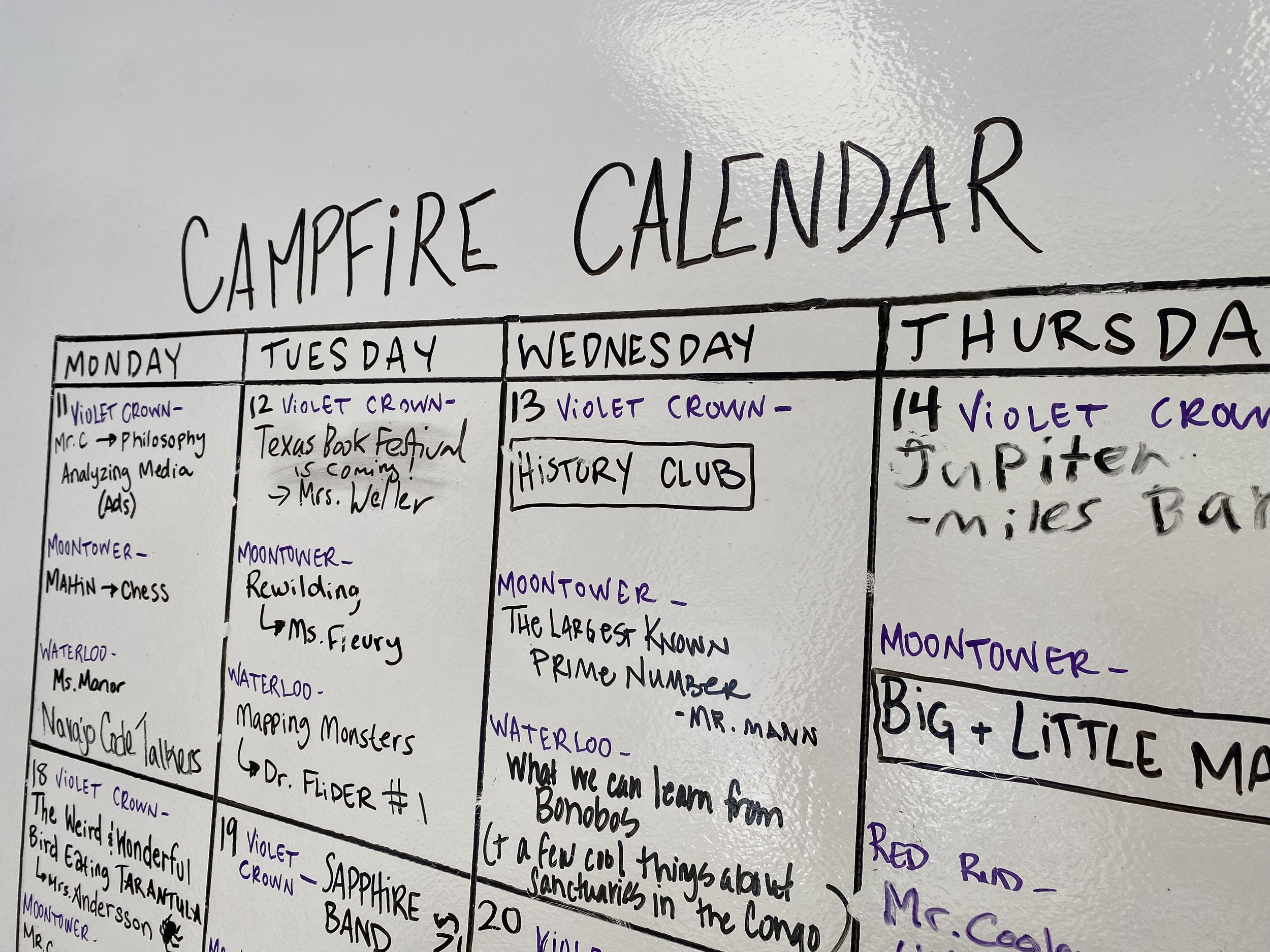Campfire
If you were to walk into Long-View in the morning, before the school day begins, you would walk into a busy scene. Even though the day doesn’t officially start until 9am, you’d see kids huddled across the school, busily entrenched in projects or workshops that interest them. Yesterday, for example, you would have found five girls circled up in a book club that Nora started and you’d have seen Siddharth working on his whittling, a new interest sparked after watching many his peers enjoy the feeling of soft wood being shaped by a sharp knife. You’d have seen Johannes teaching Mrs. Andersson 100+ step origami, Lia running a digital arts workshop, Mrs. Winchester supporting a group taking a second pass at a chemistry experiment that started the day prior in Science Block, and Clara using a drill to add a hole to a pvc pipe that is part of the “dragon wings” she is building for her Halloween costume that will mean she can unfurl wings that open to almost 18 ft wingspan. In the next room, you’d have found Mrs. White working with three girls who are happy to start their day thinking about some new math problems, while William quietly read and Yasin checked out a new book.
This was yesterday, but most mornings are quite similar. And then just before 9:00, when it is time for the day to begin, the sound of the singing bowl fills the main hallway. This low hum alerts that it’s time to begin Campfire and everyone quickly begins to tidy up from the before school projects, workshops, and other happenings, and check the Campfire calendar to choose which of the three discussions to join. Campfire topics and ideas are ignited in a variety of ways. They could be centered around a current event, a personal passion, a historical figure, a question sparked from a podcast, a desire to analyze an intriguing graph, an interesting NPR article, or wonderings about a science investigation.
On a typical day, there are 3 different Campfires happening simultaneously across Long-View for the first 25 minutes of the morning. Campfire is a community-led effort designed to spark new interests; the intent is to open the world up and help kids see how fascinating the world is. Learners and teachers have the opportunity to choose which Campfire interests them and then participate in a rich discussion.
Although the rooms are usually discussing different ideas, each Campfire begins the same way. The Campfire leaders begin by greeting the gathered community with the Zulu word “Sawabona,” which means “I see you.” The community replies “Sikhona,” meaning “I am here.” This short exchange is powerful in that it centers each individual, and brings all members of the community to the present.
You may be picturing teachers leading Campfire, which is sometimes true such as when Mrs. Andersson recently led a Campfire about her “Weird and Wonderful Bird Eating Tarantula,” but Campfires are also led by learners. For example, Ellington recently led a Campfire on birds and birdwatching, a personal interest of his. He put together a presentation to share his deep knowledge and expertise with the community. After he finished, he reflected that he felt that he was “embracing a challenge” and “taking an intellectual risk” by choosing to lead a Campfire. Another learner-led example is from Miles, who has chosen to lead a series of Campfires about planets, a topic he is especially knowledgeable about since he plans to be an astrobiologist. Jules and Elina recently ran a Campfire about “The Dark History of Bananas,” Mr. Cooley kicked off a series of Campfires focused on philosophy and Dr. Flider lead a Campfire about “The Ethics of Translation.” All three Campfires provoked high-level conversations and deep thinking.
Just as the singing bowl hums to alert us to the start of Campfire, it is also the sound that signals the closing. There’s usually a quiet, collective breath taken, full of reflection and deep thought, followed by an audible exhale that again brings all members of the community to the present. We’re left invigorated and motivated to continue learning as we start our school day.




